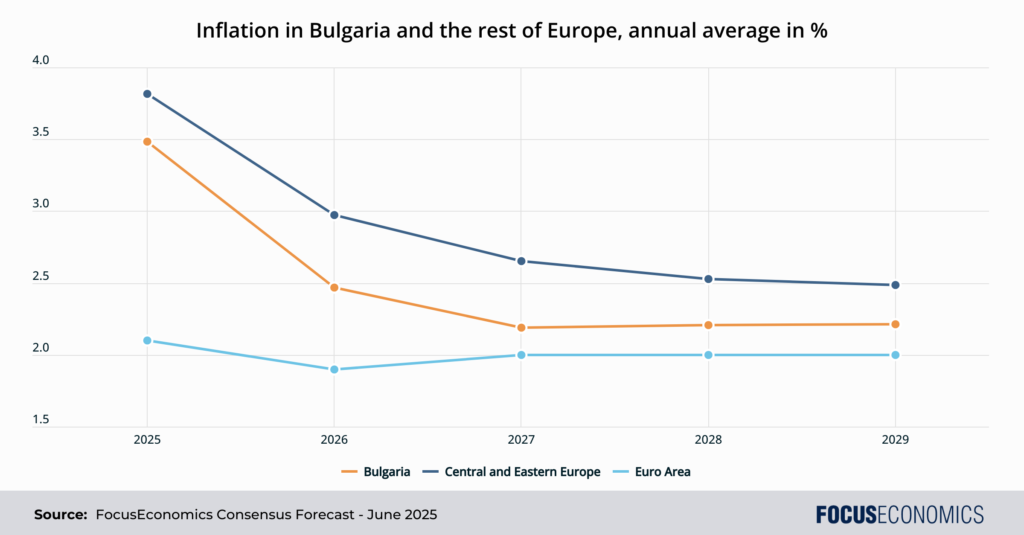On 1 January 2026, Bulgaria is set to adopt the euro, becoming the 21st member of the currency bloc. The move has been years in the making: Over two decades after pegging its currency—the lev, or “lion”—to the euro, and five years after entering the eurozone’s waiting room (ERM II), Bulgaria was given the green light in June after meeting the necessary criteria on inflation, fiscal discipline, exchange rate stability and institutional reform despite enduring an acute political crisis in 2021–2025.
A political win or a gamble?
The euro marks a symbolic and institutional win for the current governing coalition—but also a risky one. Several parties in Parliament oppose the transition, and the President called for a referendum just weeks before Brussels gave the green light.
A smooth transition could anchor Bulgaria more firmly to the European core and support financial stability. But if the transition is rockier and inflation spikes, the political fallout could be severe: Some of our panelists see a material risk of government collapse post-adoption.
Small-but-firm economic gains
Economically, joining the euro will bring subtle but powerful benefits. Bulgaria will gain access to ECB liquidity facilities, bond-purchasing programs and decision-making structures, supporting the economy in times of volatility. Our Consensus Forecast is for GDP growth to remain broadly steady through 2029, with the euro adoption cushioning momentum amid rising geopolitical and trade uncertainty.
Euro adoption will also eliminate currency risk, gradually lowering sovereign and corporate borrowing costs. As Bulgaria still lags behind eurozone peers in terms of bond yields and credit ratings, removing FX risk and strengthening its debt profile could help narrow the gap; several rating agencies have signaled potential upgrades post-entry.
Trade and tourism to see incremental gains
Our panelists foresee a notable uptick in exports growth post-adoption as FX risk fades, boosting trade and tourism flows with eurozone partners. The euro could also bolster Bulgaria’s competitiveness compared to non-euro neighbors, such as Romania and Poland. Still, the impact should be fairly limited—the euro area already absorbs nearly 50% of Bulgarian exports.
The inflation bogeyman

Bulgaria’s eurozone entry should have little impact on prices: Our panelists have broadly maintained their inflation forecasts for 2026–2029 since January. Bulgaria’s inflation should remain lower than in most non-euro neighbors, which are still exposed to FX fluctuations. Lower borrowing costs for Bulgarian firms should also cap inflation ahead.
Still, public concern about inflation remains high. The memory of the 1990s hyperinflation, combined with inflammatory populist rhetoric, could heighten sensitivity to any minor price effects from rounding and one-off conversion costs. This could fuel inflation expectations—particularly in services—becoming a self-fulfilling prophecy.
Structural challenges remain
The euro is no silver bullet. Bulgaria’s structural challenges— emigration, corruption, weak demographics—will outlive the currency change and continue to cap GDP growth over the next decade. But euro adoption will anchor Bulgaria to the EU, lock in policy credibility and reduce external vulnerabilities. As such, the euro is less about immediate transformation and more about building economic and political resilience at a time when both are in short supply.
Insight from our analysts:
Scope Ratings’ Dennis Shen and Brian Marly said:
“With inflation under control, Bulgaria is on track to adopt the euro in January 2026, a development which would support the stability of the highly euroised economy, improve monetary-policy flexibility and enhance the sovereign’s capital-market access. Bulgaria’s adoption of the common currency would support potential growth of around 2.75% a year and accelerate convergence towards average European Union living standards.”
EIU analysts commented:
“Despite rising political instability, we expect the government to remain in office this year and secure Bulgaria’s entry into the euro zone. […] The centre-right Citizens for European Development of Bulgaria (GERB), the largest governing party, has stated that the government must remain in power for at least 18 months to ensure a smooth currency changeover—a timeline that would coincide with the presidential election scheduled for autumn 2026.”
S&P Global analysts said:
“The ambition for eurozone accession has provided an important policy anchor for tight fiscal management, especially in times of political instability. The current budget and fiscal plans target deficits remaining at about 3% of GDP on average over the next three years, which seems achievable. However, we anticipate downside risks due to increased defense spending from 2027 and potentially weaker revenue growth.”
